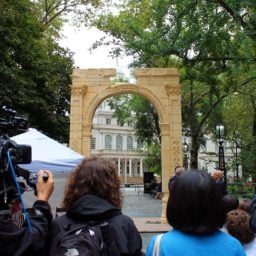The Islamic State, or ISIS, is increasingly relying on looting and selling artifacts to help fund its operations. While there is nothing new about the mixture of archaeological sites and looting activity, what is different now, according to recent reports, is the scope of their operations and the fact that ISIS operates in one of the richest archaeological arenas in the world.
Experts estimate that up to $300 million worth of antiquities are flooding the market through Turkey, Lebanon, and Jordan.
The Financial Times says the scale of digging now occurring in sites that are controlled by ISIS is “massive and mechanical.” Ancient sites at Nimrud, Ninevah, and Hatra have been destroyed and artifacts from these places are flooding the black market, including more than 100 Syrian artifacts that are said to be circulating in the London market.
While ISIS members have been seen smashing sculptures with sledgehammers in widely circulated videos, the terrorist organization is also wise to the money to be made in selling these ancient artifacts.
Both the FT and a Bloomberg story quote Syrian-born Dr. Amr Al-Azm, an anthropology professor in Ohio at Shawnee State University. Al-Azm, who was recently offered a $250,000 ancient Mesopotamian vase via a text message, told the FT there are two types of looting—the institutionalized work of ISIS diggers and bulldozers, and the subsistence looting by displaced people, many of whom are on the brink of starvation.
According to Bloomberg, ISIS is now a growing player in the $3 billion global antiquities market. “Willingly or not,” wrote Sangwon Yoon, “buyers are filling the extremists’ coffers.”
Quoting Louise Shelley, author of Dirty Entanglements: Corruption, Crime and Terrorism Terrorism, the report says ISIS “operates like a diversified criminal business.”
ISIS’s fundraising structure rapidly evolved from collecting a 20 percent tax from diggers and dealers working on their territory, to running its own digs and trades. They are linked to Turkish crime networks in the border towns of Gaziantep and Akcakale.
For related coverage, see:
UN Condemns Isis Destruction of Iraqi Sites as War Crimes
Ancient Ruins of Palmyra Under Threat as ISIS Reaches City Gates






